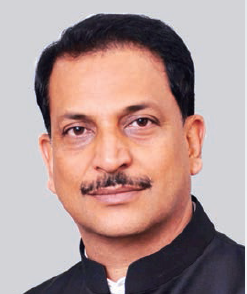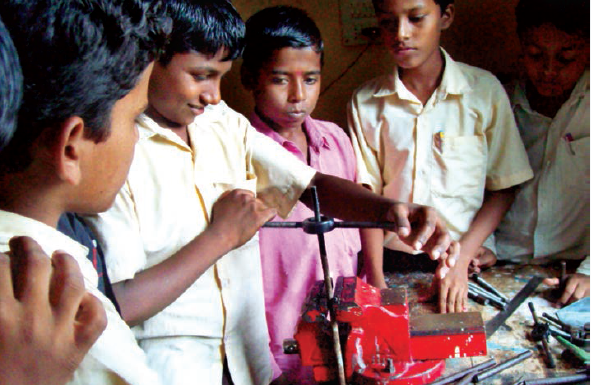Rajiv Pratap Rudy
Biz@India
May 2016
Towards Making India ‘the Skill Capital of the World’

Rajiv Pratap Rudy, Union Minister of Skill Development & Entrepreneurship (Independent Charge)
The Ministry of Skill Development and Entrepreneurship is revamping its strategies and policies, launching new schemes, strengthening the PPP model and exchange programmes with international markets like Europe, shares the minister.
To begin with, what are your strategies and policies for the growth of skill development and also your vision in the long-term?
Ministry’s vision for the country is very clear, which is making India the skill capital of the world. Of India’s 1.25 billion population, 65 pc is in the workable age and that is a big demographic advantage that we are sitting on right now. If we empower our human resources with the latest skill sets and the supplementing knowledge, we can ensure growth to not only each individual but support to other geographies as well where there is a requirement of skilled workforce.
Our policies and strategies have all been revamped to address the supply and demand gap that we have within the country and even in geographies abroad. Our standards of skill development are aligned to transnational standards and we are happy to see how the youth of our country is not only exploring opportunities in sectors within India but is also being offered jobs from our other international markets.
What are the key achievements that have been made so far?
We have introduced the ministry’s flagship scheme Pradhan Mantri Kaushal Vikas Yojana (PMKVY), an outcome-focussed, reward-based scheme and more than 1.9 million candidates have benefitted from it. We have been able to re-vitalise the Industrial Training Institutes (ITIs) ecosystem and the private skill training ecosystem through National Skill Development Corporation (NSDC). And at the same time we have been successful in scaling up initiatives under entrepreneurship, in bringing about comprehensive reforms in apprenticeship and Apprentices Act and overall, have been able to make skills aspirational for the youth.
How is the PPP model (publicprivate partnership) working now in the skill ecosystem?
The model will work well for all. There is no domain where work can happen in isolation. The public and private entities have to come together in their respective roles to benefit the overall ecosystem. So far the private skill training ecosystem, which is catalysed through NSDC has trained over eight million students, till date.
We are bringing the PPP model in the ITIs as well. This is important for their upgradation. Till now we have ITIs that have either been standalone governments or private ones. The recent budget has announced our vision of having 1500 Multi Skill Training Institutes (MSTIs), which basically will be the new generation ITIs set up in PPP mode.
The formation of the National Skill Certification Board is another big step, which will see representation both from the government and the industry, who will collectively enable a joint framework for quality skill assessment. This will further strengthen the skill ecosystem.
What are the challenges prevailing in skill development area and how can your ministry overcome them?
The society at large is receptive of the concept of skill development but at the same time it has to find it aspirational as well. The youth and specially their parents have to realise that a degree might get them the opportunity to do a job but it is only the skills of a person that will help him or her sustain it. There has to be ample respect for each kind of skill whether it is that of a security guard or a house help or even a carpenter or a plumber, which is a big requirement in the country.
We are seeing enthusiasm in the youth to know about various schemes under skill development and how they can benefit from it. We get hundreds of queries every day on our social media pages and more than 2000 calls every day to know more about skill development. In the last few years, we have skilled more than eight million youths, which reflects the interest of the people.
Large number of jobless youth from smaller towns and rural areas are now migrating to big cities in search for jobs. How are you planning to boost entrepreneurship amongst them?
We have done an extensive mapping exercise – sector-wise and state-wise so that we are aware of the requirement at the very local level. The ‘Skill India’ campaign is aligned to the same and focuses on leveraging the demographic advantage by helping bridge the demand and supply gap right at the local level, which can result into the overall economic growth.

Government has launched schemes such as Sabla for the empowerment of adolescent girls between 11-18 years
With regard to entrepreneurship we will soon ensure that a specific module on basic entrepreneurial skills is imparted to all, right in the beginning of every course, so that they can decide if they want to find a job or create one for themselves. All these initiatives will certainly create more opportunities locally for the youth.
I always endorse the fact that the best way to predict your future is to create it. Entrepreneurship will be a key element in India’s future. We have recently announced a scheme called ‘Udyamita’ through which we will educate and equip potential and early age entrepreneurs. Our objective is to create 3,000 start-ups over the next five years. Consequently, these start-ups will create around 260,000 direct and indirect jobs. We aim to create a strong pool of around 5,500 entrepreneurship educators and 10,000 mentors and also set up 360 social enterprises over five years.
Access to skilled talent pool has become a big challenge for the Indian companies; how serious is this challenge for your ministry and what measures is the government taking to ensure that adequate skilled manpower is available?
The seriousness is evident from the fact that the Prime Minister of India has created a standalone ministry to address the requirement of skilled workforce in India. We have identified 41 sectors so far where there is an incremental requirement of human resources. Top 24 of these sectors require close to 109 million people to fill this incremental demand across various job roles. So there is certainly a requirement. Despite the demand if there are challenges that companies have; then it might be a question on employability of the youth. This is being addressed by our ‘Skill India’ program where the courses are aligned to industry standards and match their specific requirements.
What kind of skills are you focussing on?
Our focus is both on traditional skills like carpentry, welding, masonry, nursing and tailoring and also on non-traditional job roles in niche areas like strategic manufacturing, domestic help, green technologies, beauty and wellness and sports. We have so far identified more than 4,500 National Occupational Standards (NOSs), which are aligned to around 1600+ Qualification Packs (QPs).

Saksham or Rajiv Gandhi Scheme for empowerment focuses on skilling adolescent boys between 11-18 years
There is a special focus towards jobs that will be created by the ‘Make in India’ campaign of the government across the 25 sectors identified under the programme. These opportunities are being mapped through our Sector Skill Councils (SSCs) and our network of affiliated training partners in the skill ecosystem.
How do these skills help?
An industry and government recognised skill certificate can be a certificate for a better life. Honing a skill will not only enhance the efficiency of a person but will also increase his opportunities of employment.
Skill development does not focus only on technical enhancement but also impacts personal development of a person. The training in soft skills and entrepreneurship builds confidence into the youth and helps him channelise his path to the opportunities available around him. Expertise in a skill set can also lead to better wages and in turn lead to a better living.
How has been the participation of global companies planned in the training programmes and from which all countries?
We have signed partnerships with countries such as the UK, US, Canada, Germany, Australia, France and others. We have several models through which companies and countries can collaborate with us. The partnerships with countries enable exchange of best practises in skill development, mapping sectors which will have more opportunities for employment and models that can be replicated to best suit the demographics and geography.
There is ample opportunity for global companies to collaborate with us on skill development. Either they can contribute to the National Skill Development Fund for skill initiatives by extending their CSR (Corporate social responsibility) funds, or they can extend existing infrastructure support in the country, which can be capitalised for skill trainings. They can additionally partner with us for hiring of skilled workforce or we can train and assess their employees under our Recognition of Prior Learning (RPL) program and certify them under Skill India.
How have been the exchange programmes of India with European countries in terms of skill development as India and European Union have plans to launch Europe-India Skill Development Mission jointly soon?
India is working with Europe on the India-EU Skills Development project funded by the European Union which assists the National Skill Development Agency (NSDA), selected State Skill Development Missions (SSDMs) and Sector Skill Councils (SSCs) in implementing policies aimed at skilling large numbers of Indian men and women to increase their employability and entrepreneurship, as a precondition of economic and social development.
The project has been using international experience for developing institutional capacities in the Indian context, by helping to define standards and procedures of implementing the National Skill Qualification Framework (NSQF) and by supporting the development of the Indian Labour Market Information System (LMIS). At the ground level the project experts have been working with Indian partners on piloting labour market analysis through company surveys, on assessing training needs, on developing and testing examples of competence-based curricula and on training the trainers and assessors. We are exploring more avenues where India and EU can work together and will be keen for a mutually beneficial partnership.
Do you think an event like OECD (Organization for Economic Cooperation and Development) can help India in its skill development ambitions?
It is important for us today to have a conversation around skills and the importance of skill development. Considering that today India has a huge demographic dividend to reap and has the potential to become the Skill Capital of the world, dialogues on how countries, governments, ministries can come together and join hands are a must and platforms like OECD are great place to engage.









